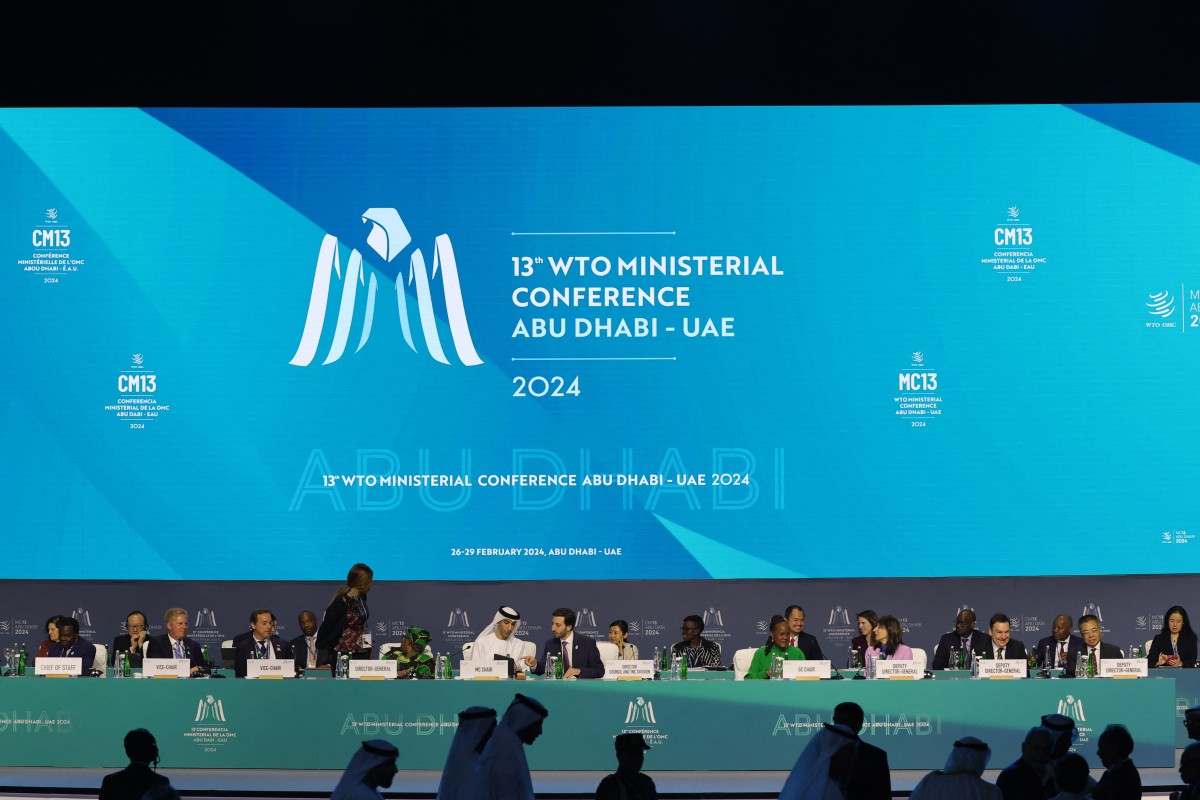Abu Dhabi, United Arab Emirates –– The World Trade Organization Tuesday enshrined new rules facilitating trade in services between more than 70 member states, the European Union’s trade commissioner said, despite initial objections from India and South Africa.
The set of rules will streamline authorization requirements and ease procedural hurdles faced by businesses, according to a press release.
It will help reduce the costs of global services trade by more than $119 billion every year, it added.
Its integration into the WTO implies all 164 members have approved as per the body’s rules which require full consensus.
“Reaching this outcome…and integrating it into the WTO has not been an easy pass,” EU trade commissioner Valdis Dombrovskis said during the WTO’s 13th ministerial conference in Abu Dhabi.
“We faced opposition from two WTO members” but a “spirit of compromise” eventually cleared hurdles, he said without naming any country.
WTO chief Ngozi Okonjo-Iweala, meanwhile, thanked “India and South Africa for finding a way forward,” calling services the “future of trade.”
Global services exports are valued at more than $6.5 trillion, representing 23 percent of total world trade, according to the EU.
The latest WTO agreement applies to 71 member states who signed the initiative but businesses from other member states can also benefit.
China, the United States and the EU are among the 71 signatories. India and South America have not signed.
Costa Rica, which led the negotiations on the initiative, called it “a significant milestone” for member states and the WTO.
This “is the first WTO result in the field of services in more than 25 years. A real success story for this organization,” said Costa Rica’s foreign trade minister Manuel Tovar.
Tough negotiations
The world’s trade ministers are set for tough negotiations on Tuesday at a WTO meeting in Abu Dhabi, with fisheries and agriculture taking center stage.
The closed talks will take place on the second day of the World Trade Organization’s 13th ministerial conference which is scheduled to run until Thursday but could go into over-time amid divisions.
There is little hope for major breakthroughs with WTO rules requiring full consensus among all 164 member states.
But progress could be made on a new global agreement on fisheries subsidies.
After a 2022 deal which banned subsidies contributing to illegal, undeclared and unregulated fishing, the WTO hopes to conclude a second package focusing on subsidies which fuel overcapacity and overfishing.
“We’re close. It’s doable for sure,” said a diplomatic source.
“The final push needs a little bit of compromise, a little bit of political will,” the source told AFP on condition of anonymity, calling a potential agreement a “very good outcome”.
The 2022 agreement has yet to take effect as not enough countries have ratified it.
But it was seen as a major achievement, marking just the second accord concluded by the WTO’s full membership since the global trade body was created in 1995, and the first focused on environmental protection.
‘Sensitive issues’
Negotiations in recent months at the WTO headquarters in Geneva have enabled a draft text to be brought forward for a second fisheries deal.
The draft provides for a ban on subsidies that promote overfishing and overcapacity, unless they fall within the framework of a fishery resource management mechanism based on sustainability criteria.
The text would essentially divide member countries into three groups, with the largest subsidy providers subject to greater scrutiny.
It provides flexibilities and advantages for developing countries.
But some — notably India — are demanding concessions, including transition periods that others consider too long.
“We have some sensitive issues, some discussions to have, particularly with India and with certain countries, but we are relatively confident in our abilities to finally seal this agreement,” said a French diplomatic source.
Some NGOs, meanwhile, are concerned that too much leniency could compromise the outcome.
A “clear prohibition with fewer exemptions probably would be the best” approach, said Ernesto Fernandez Monge of the Pew Charitable Trusts, a nongovernment organisation that seeks to improve public policy.
But “we believe that it’s important to have an agreement than no agreement,” he told AFP.
– Agriculture –
Unlike other WTO agreements which aim to lift trade barriers or counter trade distortions, the draft text — just like the 2022 agreement — forms part of the United Nations’ sustainable development goals.
“It would be good if we can conclude that second” package, a WTO trade delegate told AFP on condition of anonymity.
But the long transition periods demanded by some states such as India is a major sticking point, the delegate said.
While a fisheries deal is largely seen as the only viable outcome of the full WTO conference (MC13), agriculture will also be a hot topic of debate.
Many member states want action on domestic measures that distort trade.
Discussions revolve around issues including market access and export competition and restrictions.
Food security will again be on the agenda, with deep disagreement over a demand from India and others for a permanent solution for public stockholding of food instead of temporary measures.
“Given the centrality of the issue this week I implore you to deliver an agriculture outcome at MC13, even if it is setting the platform to do later a more solid work going forward,” WTO director general Ngozi Okonjo-Iweala said on Monday.
Edwini Kessie, WTO’s director of agriculture and commodities, acknowledged that there is no “convergence” on an agriculture agreement.
“Clearly the most difficult issue is public stockholding,” he said.
“It is not easy.”








